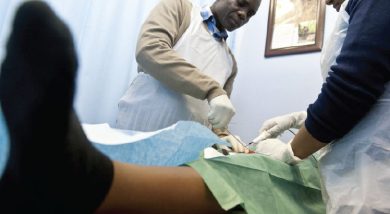Vanessa’s victory over CDSS woes
Against all odds, Vanessa Banda, 16, scored 12 points in last year’s Malawi School Certificate of Education (MSCE) examination.
The teen girl is widely hailed as a star performer at Mpherere Community Day Secondary School (CDSS) in Ntchisi District.
The low-tier secondary schools, which typify Malawi’s desperate attempt to absorb increased enrolment following the introduction of free primary education, remain hugely constrained despite enrolling the majority of children, especially in rural areas.
The shortage of basic resources, including laboratories and teaching aids, makes it tough for CDSS students to excel in national examinations despite a reduced pass mark.
Although the rural school has few textbooks in its tiny library and no laboratory, Vanessa passed with distinctions in all sciences.
“I scored two points each in mathematics, physical science and chemistry,” she explains. “However, we have no laboratory, but only a few apparatus. This affects students’ preferences for science subjects.”
The girl, who aspires to become a surgeon, believes she could have done better if the school was better equipped for the teaching and learning of science and mathematics.
Disparities between conventional secondary schools and CDSSs are clear during national examinations administered by the Malawi National Examinations Board (Maneb).

Last year, 71.8 percent of nearly 37 000 Form Four students in conventional secondary schools passed MSCE, Maneb reports. However, CDSSs, which absorb more than twice conventional secondary schools’ intake, registered a 49.4 percent pass rate
Although the CDSSs are said to be prioritised when allocating resources for secondary education, they are at risk of remaining behind.
Ntchisi, which has a single conventional secondary school, came ninth on the list of best-performing education districts, with a 60.98 percent pass rate.
Justice Dunstan Chimgonda-Nkhoma, from Ntchisi, commends Mpherere CDSS teachers and students for their hard-working spirit, urging others to emulate the good example despite the prevailing setbacks.
“The school’s feat calls for more support to CDSS, especially remote ones. With adequate resources, they can achieve more,” he says.
Recently, Civil Society Education Coalition (Csec) executive director Benedicto Kondowe asked the government to even up inequalities that slow learners’ performance, especially in CDSSs.
According to the activist, the schools at risk of being left behind lack quality infrastructure, teachers as well as teaching and learning materials.
“Government should also promote equitable deployment policies that favour the poor considering that 90 percent of all under-qualified teachers are deployed in CDSSs that form two-thirds of all secondary schools in the country,” he explained.
Teachers Union of Malawi (TUM) secretary-general Charles Kumchenga said the freeze in the recruitment of teachers and low funding affect the quality of education, especially in CDSSs.
In 1999, the government converted scores of distance education centres into CDSS to reduce the exclusion of deserving children leaving primary schools where fees had been scraped to increase access to learning.
The policy was influenced by a study funded by the Danish Secondary School Support Programme to minimise an “open apartheid” education system where only a few “intellectually fortunate” pupils made it to relatively well-staffed conventional secondary schools with basic learning facilities such as boarding, libraries and laboratories.
However, the programme, including the provision of mobile laboratories, textbooks and temporary teachers in CDSSs, was disrupted when Denmark cut aid amid a diplomatic stand-off with Malawi.
Teachers, learners and parents are concerned that public investment to reduce the inequalities remains scanty, with many CDSS hugely understaffed and using improvised libraries and labs.
African Development Bank also supported the Ministry of Education to provide classrooms, libraries, laboratories and administration blocks for CDSSs, but only a few of the targets were achieved.
Vanessa and Mpherere CDSS head teacher Paul Chikuta urge the government to provide equal resources for all schools regardless of their status.
As she waits to go to university, Vanessa urges CDSS students, especially girls, to work harder and never look down upon themselves.
“It wasn’t easy to score 12 points,” she says. “My father lost his job seven years ago and I depended on my grandfather for my educational needs, including school fees.
Vanessa was a day scholar because she could not afford a place in the school’s boarding facility. However, this did not stop her from pursuing her goals.





